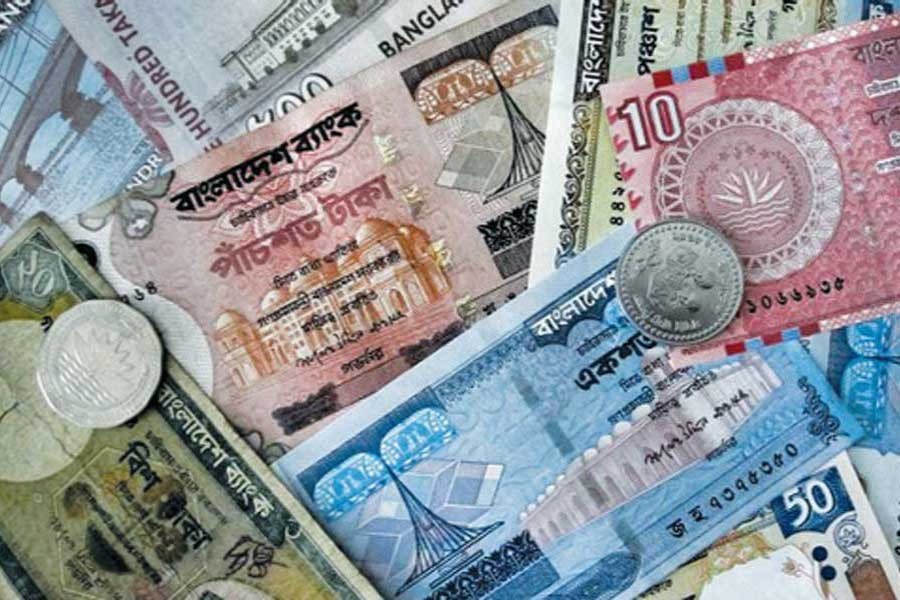In the wake of novel coronavirus, Bangladesh's economy may land in a dire situation in coming days. Economic activity is not being noticed to take place to a great extent. The Covid-19-affected economies in the world have been struggling to survive. Bangladesh is no exception and the country now faces immense economic disruption due to the coronavirus outbreak. Many organisations coupled with think-tanks are trying their level-best to show the right recovery path aiming to revamp the corona-ravaged economy. According to media reports, a large section of people are unable to have three meals a day now.
Already the International Monetary Fund (IMF) released its visionary prediction about Bangladesh's economy. "Bangladesh is set to face 3.8 per cent growth for fiscal year 2019-20 from its earlier estimate of 7.4 per cent in the aftermath of the pandemic" IMF said in its research paper. Washington-based multilateral lender World Bank (WB) recently disclosed its grim projection about Bangladesh's economy hit hard by Covid-19. The economy might experience around 2.0 per cent to 3.0 per cent GDP growth rate in 2020, 1.2 per cent to 2.9 per cent in 2021 and 2.8 per cent to 3.9 per cent in 2022. Nevertheless, unemployment rate is soaring and the rate may rise close to 35 per cent shortly.
In view of the gloomy projection made by donor agencies, a series of economic measures should be undertaken right now. Our developing economy is mainly dependent on export earnings and foreign remittance. In recent months, export earnings began to shrink drastically. Export orders worth around 3.0 billion US dollars were cancelled indicating that the economy is going to face a hurdle soon. The country's trade deficit rose by 1.74 per cent or US$243 million year-on- year during July-April of the fiscal year (FY) 2019-20 as export earnings drastically fell due to the Covid-19 pandemic, according to Bangladesh Bank sources. Before the countrywide shutdown induced by the Covid-19, trade deficit in the first nine months of the last fiscal year fell by US$123 million or 1.01 per cent - to US$ 12.07 billion year on year.
However, the situation changed during July-April of FY 2019-20 with the country's trade deficit widening to US$14.22 billion against US$ 13.98 billion in the same period of FY19. In April, Bangladesh's export earnings dropped by 82.85 per cent to US$ 520.01 million from US$ 3.03 billion in the same month of last year. Imports also fell by 8.77 per cent or US$ 4.13 billion to US$ 42.97 billion during July- April of the FY 20 from US$ 47.11 billion in the same period of FY19.
Inflows of foreign remittance have narrowed since start of the pandemic. The fall in oil prices in Middle-Eastern countries forced the Bangladeshi labour force to stay at home without work. Bangladesh's inward remittances might fall by around 22 per cent in 2020 following the ongoing global crisis caused by Covid-19 pandemic, according to the World Bank. The inflow of remittances dropped by 25 per cent year on year to US$1.08 billion in April, registering a fall of US$353 million from the same month a year ago. The volume of Bangladesh's inward remittances is likely to reach US$14 billion at the end of 2020, compared to over $18 billion in 2019, WB said in its report on 'Covid-19 Crisis Through a Migration Lens' recently.
The current account deficit, however, fell by 22.49 per cent to US$ 4.12 billion in the first ten months of the last fiscal year from US$ 5.32 billion in the same period of FY19. The country's overall balance stood at a surplus of US$ 623 million during July-April of FY 20, against a deficit of US$ 590 million in the same period of the previous fiscal year. During July-April, the net foreign direct investment dropped by 20.06 per cent to US$ 1.88 billion from US$ 2.35 billion in the same period of FY19.
The position of Balance of Payments (BoP) and current account maintained by Bangladesh Bank is not admirable at all. These two indicators represent the economy whether its current condition is strong or not. There is a deficit of around 15 to 20 billion US dollars in Bangladesh's balance of trade in terms of export earnings and import costs. In view of BoP scenario, the government seems to be interested to take soft loans from multilateral donor agencies-the World Bank, International Monetary Fund ( IMF), Asian Development Bank ( ADB).
Considering the current situation, we may decide on depreciating the Bangladeshi currency to overcome the present economic obstacles. Currency devaluation causes improvement in the current account due to higher exports and lower imports. In the short run, devaluation tends to cause inflation, higher growth and increased demand for exports. The Corona-ravaged economy might experience sharp growth in the days to come, if the currency depreciation plan is undertaken right at this moment. As a result of currency depreciation, foreign employees will move elsewhere. Then, the demand for local workers is expected to rise sharply. Nevertheless, the domestic tourism industry will see a ray of hope, the if currency depreciation takes place.
It is important to point out that the importers and fixed-income people may face difficulties due to the currency depreciation. At this moment, we have to utilise domestic resources instead of importing goods from abroad. Raw materials for export-oriented industries might be managed domestically. If we can plan to depreciate Bangladeshi currency in view of the economic scenario, surely many negative indicators related to macroeconomics will recover shortly. The local think-tank Center for Policy Dialogue (CPD) also recently recommended currency depreciation. Briefly speaking, currency depreciation brings good for a longer period in our economy, though it has a negative impact in the short term. The government may sit with economists, think-tanks and experts regarding the time-bound issue that is important to bring the current account balance.
Md Mazadul Hoque is a banker and analyst of economic affairs.
[email protected]


